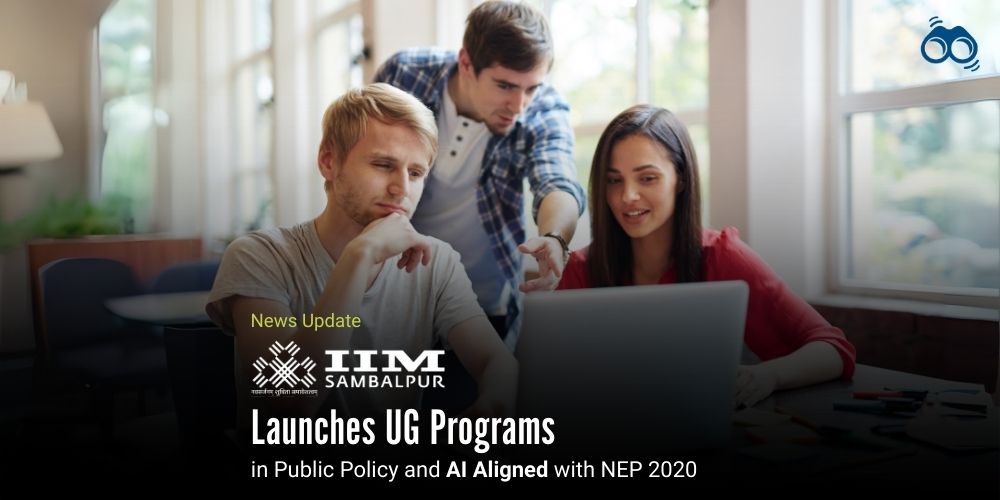Future-Ready Education: IIM Sambalpur Expands Offerings with Interdisciplinary Courses
IIM Sambalpur: Admissions Begin June 2025; Programmes Designed for Flexible, Multi-Exit Learning
As artificial intelligence continues to transform industries and redefine job roles, there is a growing demand for professionals who possess both technological expertise and a deep understanding of policy-making. Organisations across the globe are integrating AI into their operations and are also in search of leaders capable of addressing its ethical and societal implications. In response to this dual demand, IIM Sambalpur has adopted a forward-looking approach by launching two specialised undergraduate programmes.
Through the introduction of the Bachelor of Science in Management and Public Policy and the Bachelor of Science in Data Science and Artificial Intelligence, the institute has expanded its academic portfolio. These programmes, developed following the National Education Policy (NEP) 2020, underscore IIM Sambalpur’s dedication to interdisciplinary education. By blending technical skills with policy insights, the programmes aim to equip students with the capabilities needed to thrive in an evolving global landscape and drive innovation with responsibility.
According to an official statement, the newly launched courses aim to strengthen students’ competencies in critical areas such as data analysis, critical reasoning, and evidence-based decision-making. By integrating contemporary industry demands with academic excellence, IIM Sambalpur seeks to provide students with a robust foundation for leadership and innovation in emerging fields.
Elaborating on the focus areas of the programmes, the institute stated that the Bachelor of Science in Management and Public Policy will address national managerial needs in sustainability, ESG (Environmental, Social, and Governance), and community-led development. The curriculum aims to prepare students to bridge the gap between policy formulation and grassroots implementation, ensuring they develop the skills necessary to contribute meaningfully to governance and leadership. Admissions for this programme will be based on Common University Entrance Test (CUET) scores.
Similarly, the Bachelor of Science in Data Science and Artificial Intelligence has been designed to enhance the country’s digital capacity and global competitiveness. Co-developed with industry leaders, this programme focuses on building future-ready skills and promoting the ethical use of AI. The institute noted that the cross-functional curriculum aims to develop responsible leaders capable of addressing complex societal and industrial issues with innovation, empathy, and a global perspective. Admissions for this programme will be based on JEE Main scores.
IIM Sambalpur has announced that admissions for these new undergraduate programmes will begin in June 2025, with classes for the first batch scheduled to commence in September 2025. Prof. Mahadeo Jaiswal, Director of IIM Sambalpur, highlighted the launch of the four-year fully residential B.S. The programme marks a significant step toward developing future-ready leaders. He emphasised that the initiative aligns with the NEP 2020, reinforcing the institute’s vision to nurture responsible and entrepreneurial leadership.
Further outlining the flexibility of the undergraduate programmes, Jaiswal explained that students would have the option to earn a certificate after one year, a diploma after two years, a degree after three years, and an honours degree after four years, thus incorporating multiple entry and exit points to ensure accessibility and adaptability. The launch event also featured a roundtable discussion on ‘Global Capability Centres (GCCs) as Engines of Innovation for Global Enterprises.’ Bramhanand Jha, PMP, Vice President at the National eGovernance Division under MeitY, Government of India, was the chief guest. He highlighted how India’s GCCs had evolved from low-cost service centres to strategic innovation hubs, significantly contributing to global enterprises. He stressed that, as the economy transitions to a digital-first model, these centres are at the forefront of agile and technology-driven advancements.
The event was further enriched by keynote addresses from Lt. Col. Piyush Shukla, Director of JEE at the National Testing Agency (NTA), and Rajesh Kumar, Director of CUET at NTA. They discussed the increasing role of GCCs in global innovation and digital transformation, underscoring their strategic significance in shaping the future of work. Lt. Col. Shukla also addressed the evolution of India’s education evaluation system, emphasising the need to identify and nurture talent suited for fast-paced, innovation-driven environments like GCCs. He commended IIM Sambalpur for launching forward-thinking undergraduate programmes that integrate analytical skills with policy and technological expertise.
Meanwhile, Rajesh Kumar noted that the introduction of CUET was a pivotal step in democratising access to quality higher education in India. He reaffirmed the NTA’s commitment to fostering a fair, transparent, and standardised testing system, ensuring that students are well-equipped for global leadership and innovation. The event concluded with panel discussions led by senior academicians and industry leaders, covering topics such as ‘Transforming Operations through GCCs: The Digital Shift from Cost Efficiency to Strategic Value’ and ‘Aligning Talent Upskilling with Policy Innovation for Sustainable GCC Growth’. These discussions highlighted the growing significance of GCCs in shaping digital transformation and the necessity for aligned educational and policy frameworks to support their continued development. With the launch of these undergraduate programmes, IIM Sambalpur reaffirms its commitment to fostering innovation, leadership, and global competitiveness in education.
Editor’s Note:
The launch of IIM Sambalpur’s two new undergraduate programmes marks a timely and commendable response to the evolving demands of today’s education and employment landscapes. As artificial intelligence and digital transformation reshape industries, it is encouraging to see a premier institution take concrete steps to prepare students not just with technical knowledge but with an ethical and policy-driven outlook. By aligning with the NEP 2020 and integrating industry input, these programmes offer a blend of academic rigour and real-world relevance. However, the true value of such initiatives will lie in their implementation and the opportunities they create for students from diverse backgrounds. With flexible learning paths, transparent admissions, and a strong focus on leadership and innovation, IIM Sambalpur is setting a strong precedent.
Skoobuzz highlights that if executed effectively, this approach can serve as a model for other institutions striving to produce graduates who are job-ready and also future-resilient and socially responsible.














0 Comments (Please Login To Continue)